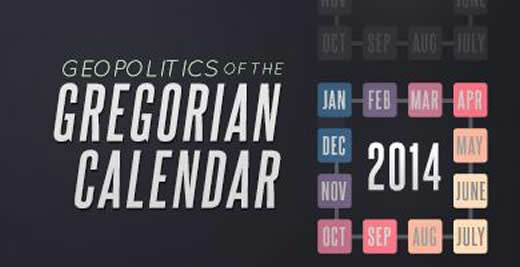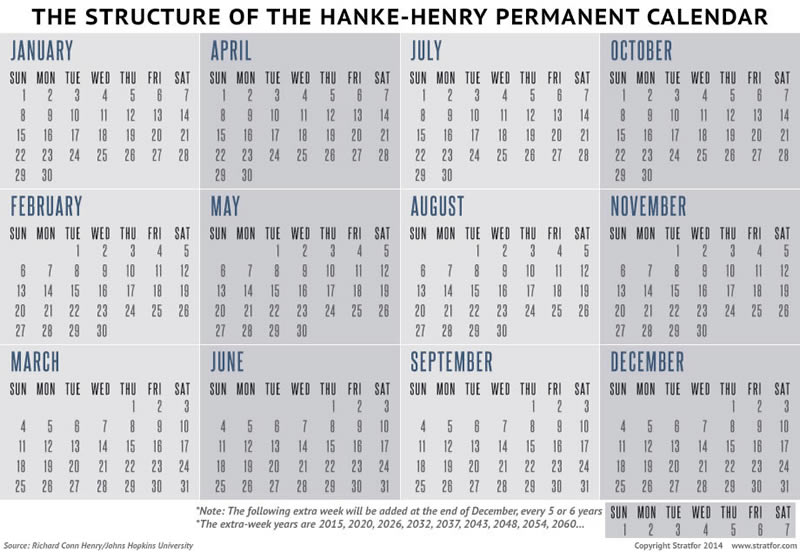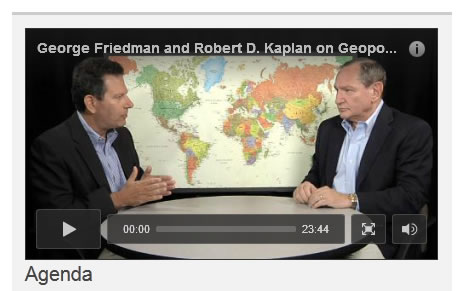The Geopolitics of the Gregorian Calendar
Politics / GeoPolitics Jan 02, 2014 - 11:18 AM GMTBy: STRATFOR
 When England adopted the Gregorian calendar in 1752, some 170 years after it was introduced by Pope Gregory XIII, Benjamin Franklin wrote, "It is pleasant for an old man to be able to go to bed on Sept. 2, and not have to get up until Sept. 14." Indeed, nearly two weeks evaporated into thin air in England when it transitioned from the Julian calendar, which had left the country 11 days behind much of Europe. Such calendrical acrobatics are not unusual. The year 46 B.C., a year before Julius Caesar implemented his namesake system, lasted 445 days and later became known as the "final year of confusion."
When England adopted the Gregorian calendar in 1752, some 170 years after it was introduced by Pope Gregory XIII, Benjamin Franklin wrote, "It is pleasant for an old man to be able to go to bed on Sept. 2, and not have to get up until Sept. 14." Indeed, nearly two weeks evaporated into thin air in England when it transitioned from the Julian calendar, which had left the country 11 days behind much of Europe. Such calendrical acrobatics are not unusual. The year 46 B.C., a year before Julius Caesar implemented his namesake system, lasted 445 days and later became known as the "final year of confusion."

In other words, the systems used by mankind to track, organize and manipulate time have often been arbitrary, uneven and disruptive, especially when designed poorly or foisted upon an unwilling society. The history of calendrical reform has been shaped by the egos of emperors, disputes among churches, the insights of astronomers and mathematicians, and immutable geopolitical realities. Attempts at improvements have sparked political turmoil and commercial chaos, and seemingly rational changes have consistently failed to take root.
Today, as we enter the 432nd year guided by the Gregorian calendar, reform advocates argue that the calendar's peculiarities and inaccuracies continue to do widespread damage each year. They say the current system unnecessarily subjects businesses to numerous calendar-generated financial complications, confusion and reporting inconsistencies. In years where Christmas and New Year's Day each fall on a weekday, for example, economic productivity is essentially paralyzed for the better part of two weeks, and one British study found that moving a handful of national holidays to the weekend would boost the United Kingdom's gross domestic product by around 1 percent.
The Gregorian calendar's shortcomings are magnified by the fact that multiple improvements have been formulated, proposed to the public and then largely ignored over the years -- most recently in 2012, with the unveiling of a highly rational streamlined calendar that addresses many of the Gregorian calendar's problems. According to the calendar's creators, it would generate more than $100 billion each year worldwide and "break the grip of the world-wide consensus that embraces a second-rate calendar imposed by a Pope over 400 years ago." This attempt, like many of the others, has received some media attention but has thus far failed to gain any meaningful traction with policymakers or the wider public.
Myriad geopolitical elements and obstacles are embedded in the issue of calendar reform, from the powerful historical role of empires and ecclesiastical authorities to the unifying forces of commerce and the divisive nature of sovereignty and state interests. Indeed, geopolitical themes are present both in the creation of the Gregorian calendar and its permanence, and its ascendance and enduring primacy tells us much about the nature of the international system.
How We Got Here
At its core, the modern calendar is an attempt to track and predict the relationship between the sun and various regions of the earth. Historically, agricultural cycles, local climates, latitudes, tidal ebbs and flows and imperatives such as the need to anticipate seasonal change have shaped calendars. The Egyptian calendar, for example, was established in part to predict the annual rising of the Nile River, which was critical to Egyptian agriculture. This motivation is also why lunar calendars similar to the ones still used by Muslims fell out of favor somewhat -- with 12 lunar cycles adding up to roughly 354 days, such systems quickly drift out of alignment with the seasons.
The Gregorian calendar, introduced by Pope Gregory XIII in 1582, was itself an attempt to address the problems of its predecessor, the Julian calendar, which had been introduced by Julius Caesar to abolish the use of the lunar year and eliminate a three-month gap that opened up between the civil and astronomical equinoxes. It subsequently spread throughout the Roman Empire (and beyond as Christianity spread) and influenced the design of calendars elsewhere. Though it deviates from the time it takes the earth to revolve around the sun by just 11 minutes (a remarkable astronomical feat for the time), the Julian system overly adjusted for the fractional difference in year length, slowly leading to a misalignment in the astronomical and calendar years.
For the Catholic Church, this meant that Easter -- traditionally tied to the spring equinox -- would eventually drift into another season altogether. By dropping 10 days to get seasons back on track and by eliminating the Julian calendar's excess leap years, the Gregorian calendar came closer to reflecting the exact length of an astronomical year (roughly 365.24 days) -- it is only off by 26 seconds annually, culminating in a full day's difference every 3,323 years.
But what was perhaps most significant about Pope Gregory's system was not its changes, but rather its role in the onset of the globalized era. In centuries prior, countries around the world had used a disjointed array of uncoordinated calendars, each adopted for local purposes and based primarily on local geographical factors. The Mayan calendar would not be easily aligned with the Egyptian, Greek, Chinese or Julian calendars, and so forth. In addition to the pope's far-reaching influence, the adoption of the Gregorian system was facilitated by the emergence of a globalized system marked by exploration and the development of long-distance trade networks and interconnectors between regions beginning in the late 1400s. The pope's calendar was essentially the imposition of a true global interactive system and the acknowledgment of a new global reality.
Despite its improvements, the Gregorian calendar preserved several of the Julian calendar's quirks. Months still varied in length, and holidays still fell on different days of the week from year to year. In fact, its benefits over the Julian calendar are disputed among astronomers. Nonetheless, its widespread adoption and use in trade and communication played a fundamental role in the development and growth of the modern international system.
Implementation Problems
From the start, however, the Gregorian calendar faced resistance from several corners, and implementation was slow and uneven. The edict issued by Pope Gregory XIII carried no legal weight beyond the Papal States, so the adoption of his calendar for civil purposes necessitated implementation by individual governments.
Though Catholic countries like Spain and Portugal adopted the new system quickly, many Protestant and Eastern Orthodox countries saw the Gregorian calendar as an attempt to bring them under the Catholic sphere of influence. These states, including Germany and England, refused to adopt the new calendar for a number of years, though most eventually warmed to it for purposes of convenience in international trade. Russia only adopted it in 1918 after the Russian Revolution in 1917 (the Russian Orthodox Church still uses the Julian calendar), and Greece, the last European nation to adopt the Gregorian calendar for civil purposes, did not do so until 1923.
In 1793, following the French Revolution, the new republic replaced the Gregorian calendar with the French Republican calendar, commonly called the French Revolutionary calendar, as part of an attempt to purge the country of any remnants of regime (and by association, Catholic) influence. Due to a number of issues, including the calendar's inconsistent starting date each year, 10-day workweeks and incompatibility with secularly based trade events, the new calendar lasted only around 12 years before France reverted back to the Gregorian version.
Some 170 years later, the Shah of Iran attempted a similar experiment amid a competition with the country's religious leaders for political influence. As part of a larger bid to shift power away from the clergy, the shah in 1976 replaced the country's Islamic calendar with the secular Imperial calendar -- a move viewed by many as anti-Islamic -- spurring opposition to the shah and his policies. After the shah was overthrown in 1979, his successor restored the Islamic calendar to placate protesters and to reach a compromise with Iran's religious leadership.
Several countries -- Afghanistan, Saudi Arabia and Iran among them -- still have not officially adopted the Gregorian calendar. India, Bangladesh, Israel, Myanmar and a few other countries use various calendars alongside the Gregorian system, and still others use a modified version of the Gregorian calendar, including Sri Lanka, Cambodia, Thailand, Japan, North Korea and China. For agricultural reasons, it is still practical in many places to maintain a parallel local calendar based on agricultural seasons rather than relying solely on a universal system based on arbitrary demarcations or seasons and features elsewhere on the planet. In most such countries, however, use of the Gregorian calendar among businesses and others engaged in the international system is widespread.
Better Systems?
Today, the Gregorian calendar's shortcomings have translated into substantial losses in productivity for businesses in the form of extra federal vacation days for employees, business quarters of different sizes and imperfect year-on-year fiscal comparisons. The lack of consistency across each calendar year has also created difficulties in financial forecasting for many companies.
Dozens of attempts have been made over the years to improve the remaining inefficiencies in Pope Gregory's calendar, all boasting different benefits. The Raventos Symmetrical Perpetual and Colligan's Pax calendars feature 13 months of 28 days, while the Symmetry 454 Calendar eliminates the possibility of having the 13th day of any month fall on a Friday. In 1928, Eastman Kodak founder George Eastman introduced a more business-friendly calendar (the International Fixed calendar) within his company that was the same from year to year and allowed numerical days of each month to fall on the same weekday -- for example, the 15th of each month was always a Sunday. This setup had the advantage of facilitating business activities such as scheduling regular meetings and more accurately comparing monthly statistics.
Reform attempts have not been confined to hobbyists, advocates and academics. In 1954, the U.N. took up the question of calendar reform at the request of India, which argued that the Gregorian calendar creates an inadequate system for economic and business-related activities. Among the listed grievances were quarters and half years of unequal size, which make business calculations and forecasts difficult; inconsistency in the occurrence of specific days, which has the potential of interfering with recurring business and governmental meetings; and the variance in weekday composition across any given month or year, which significantly impairs comparisons of trade volume since transactions typically fluctuate throughout the week.
In 2012, Richard Conn Henry, a former NASA astrophysicist, teamed up with his colleague, an applied economist named Steve H. Hanke, to introduce perhaps the most workable attempt at calendrical reform to date. The Hanke-Henry Permanent Calendar (itself an adaptation of a calendar introduced in 1996 by Bob McClenon) is, as the pair wrote for the Cato Institute in 2012, "religiously unobjectionable, business-friendly and identical year-to-year."

The Hanke-Henry calendar would provide a fixed 364-day year with business quarters of equal length, eliminating many of the financial problems posed by its Gregorian counterpart. Calculations of interest, for example, often rely on estimates that use a 30-day month (or a 360-day year) for the sake of convenience, rather than the actual number of days, resulting in inaccuracies that -- if fixed by the Hanke-Henry calendar, its creators say -- would save up to an estimated $130 billion per year worldwide. (Similar problems would still arise for the years given an extra week in the Hanke-Henry system.)
Meanwhile, it would preserve the seven-day week cycle and in turn, the religious tradition of observing the Sabbath -- the obstacle blocking many previous proposals' path to success. As many as eight federal holidays would also consistently fall on weekends; while this probably would not be popular with employees, the calendar's authors argue that it could save the United States as much as $150 billion per year (though it is difficult to anticipate how companies and workers would respond to the elimination of so many holidays, casting doubt upon such figures).
Obstacles to Reform and a Path Forward
Most reform proposals have failed to supplant the Gregorian system not because they failed to improve upon the status quo altogether, but because they either do not preserve the Sabbath, they disrupt the seven-day week (only a five-day week would fit neatly into a 365-day calendar without necessitating leap weeks or years) or they stray from the seasonal cycle. And the possibilities of calendrical reform highlight the difficulty of worldwide cooperation in the modern international system. Global collaboration would indeed be critical, since reform in certain places but not in others would cause more chaos and inefficiency than already exist in the current system. A tightly coordinated, carefully managed transition period would be critical to avoid many of the issues that occurred when the Gregorian calendar was adopted.
George Friedman and Robert D. Kaplan on Geopolitical Forecasting (Agenda)
Today, in a more deeply interconnected, state-dominated system that lacks the singularly powerful voices of emperors or ecclesiastical authorities, who or what could compel such cooperation? Financial statistics and abstract notions of global efficiency are not nearly as unifying or animating as religious edicts, moral outrage or perceived threats. Theoretically, the benefits of a more rational calendar could lead to the emergence of a robust coalition of multinational interests advocating for a more efficient alternative, and successes such as the steady and continuous adoption of the metric system across the world highlight how efficiency-improving ideas can gain widespread adoption.
But international cooperation and coordination have remained elusive in far more pressing and less potentially disruptive issues. Absent more urgent and mutually beneficial incentives to change the system and a solution that appeals to a vast majority of people, global leaders will likely not be compelled to undertake the challenge of navigating what would inevitably be a disruptive and risky transition to an ostensibly more efficient alternative.
Any number of factors could generate resistance to change. If the benefits of a new calendar were unevenly distributed across countries -- or if key powers would in any way be harmed by the change -- any hope for a comprehensive global agreement would quickly collapse. Societies have long adjusted to the inefficiencies of the Gregorian system, and it would be reasonable to expect some level of resistance to attempts to disrupt a convention woven so deeply into the fabric of everyday life -- especially if, say, the change disrupted cherished traditions or eliminated certain birthdays or holidays. Particularly in societies already suspicious of Western influence and power, attempts to implement something like the Hanke-Henry Permanent Calendar may once again spark considerable political opposition.
Even if a consensus among world leaders emerged in favor of reform, the details of the new system likely would still be vulnerable to the various interests, constraints and political whims of individual states. In the United States, for example, candy makers hoping to extend daylight trick-or-treating hours on Halloween lobbied extensively for the move of daylight saving time to November. According to legend, in the Julian calendar, February was given just 28 days in order to lengthen August and satisfy Augustus Caesar's vanity by making his namesake month as long as Julius Caesar's July. The real story likely has more to do with issues related to numerology, ancient traditions or the haphazard evolution of an earlier Roman lunar calendar that only covered from around March to December. Regardless of what exactly led to February's curious composition, its diminutive design reinforces the complicated nature of calendar adoption.
Such interference would not necessarily happen today, but it matters that it could. Policy is not made in a vacuum, and even the carefully calibrated Hanke-Henry calendar would not be immune to politics, narrow interests or caprice. Given the opportunity to bend such a reform to a state's or leader's needs -- even if only to prolong a term in office, manipulate a statistic or prevent one's birthday from always falling on a Tuesday -- certain leaders could very well take it.
Nonetheless, a fundamental, worldwide change to something as long established as the calendar is not unthinkable, primarily because it has happened several times before. In other words, calendrical change is possible -- it just tends to happen in fits and starts, lurching unevenly through history as each era refines, tinkers and adds its own contributions to make a better system. And if a global heavyweight with worldwide influence and leadership capabilities adopts the change, others may follow, even if not immediately.
Universal adoption, though preferable, is not ultimately necessary. If the United States were to deem a new calendar necessary and demonstrate its benefits to enough leaders of countries key to the international system, a critical mass could be reached (though the spread of the metric system around the world has been achieved without U.S. leadership). And the Gregorian calendar would not need to be eliminated altogether; Henry believes it could still be used by those who depend on it most, such as farmers, in the same way certain religions, industries, fields of study and states use multiple calendars for various needs.
Will the Gregorian calendar survive? Will this century end with a December lasting 31 days or Hanke-Henry's 38? The current geopolitical realities surrounding calendrical reform tells us that reform would not happen quickly or easily, but history tells us change is possible -- especially during periods of geopolitical transformation or upheaval.
"The Geopolitics of the Gregorian Calendar is republished with permission of Stratfor."
This analysis was just a fraction of what our Members enjoy, Click Here to start your Free Membership Trial Today! "This report is republished with permission of STRATFOR"
© Copyright 2013 Stratfor. All rights reserved
Disclaimer: The above is a matter of opinion provided for general information purposes only. Information and analysis above are derived from sources and utilising methods believed to be reliable, but we cannot accept responsibility for any losses you may incur as a result of this analysis.
STRATFOR Archive |
© 2005-2022 http://www.MarketOracle.co.uk - The Market Oracle is a FREE Daily Financial Markets Analysis & Forecasting online publication.





